Trusted by:
Examples of Effective Ad Campaigns for Online Courses
Running an advertising campaign is an essential part of promoting online courses. Learn how to do that from five examples from the best companies in the field.
AuthorSergey Butko
Updated: April 04, 2024
13 min read
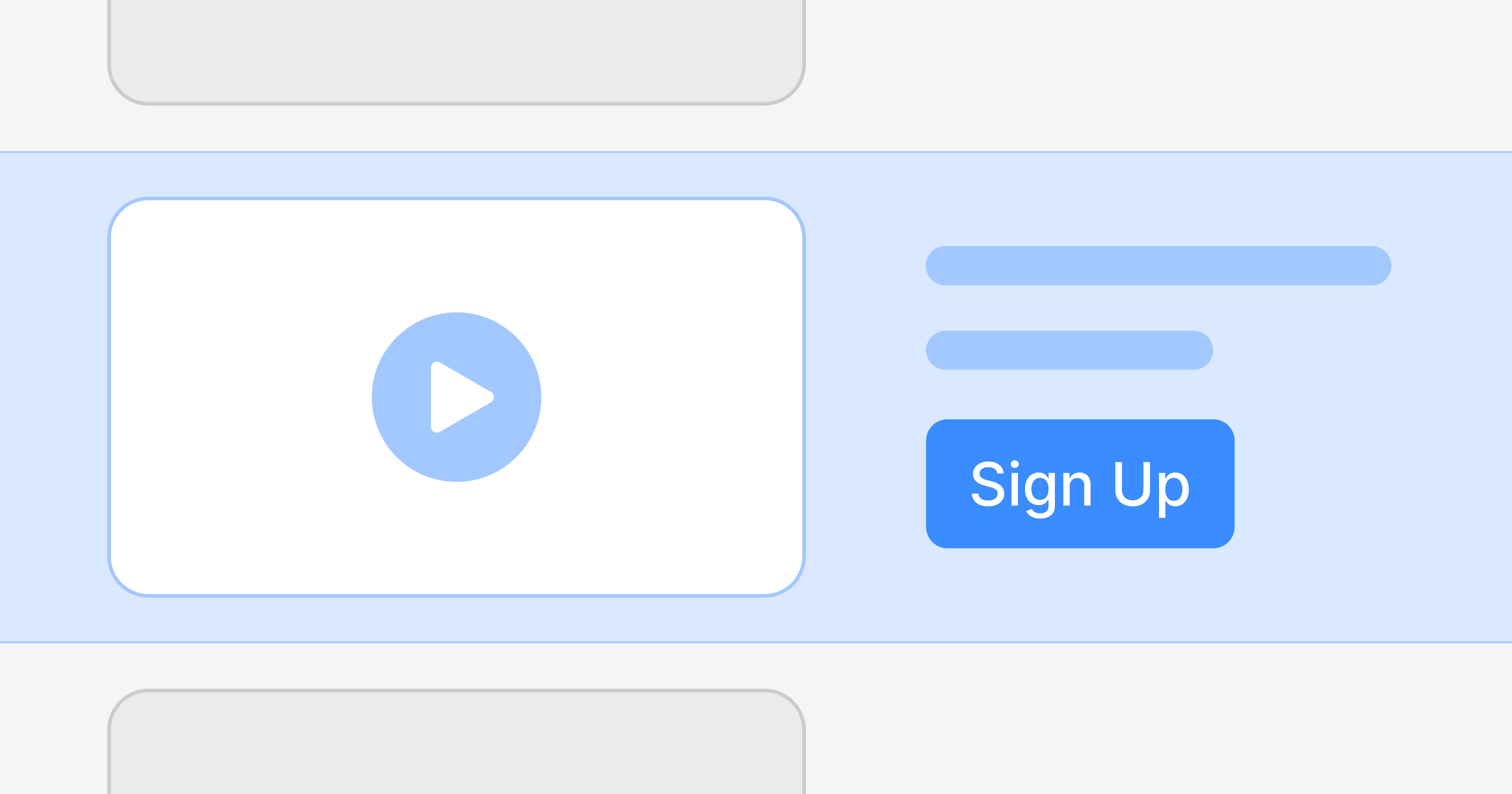
Author
Sergey Butko
Updated: April 04, 2024
13 min read
Trusted by:
Selling online courses is a great digital business model as it doesn’t require storage and logistics like ecommerce or a long sales cycle like the services sector. You only need to sell courses online to develop a high-quality course and market it well.
Multiple marketing strategies can benefit an online course business, but inevitably, most companies like this work with paid ads. However, running paid advertising might not be an optimal solution for the long term as the ROI isn’t the best, but it provides an immediate stream of leads.
The ROI of your paid ads can be much better if you create effective ad campaigns and continually optimize them.
This guide will teach you how to promote online courses with ads and analyze multiple examples of successful campaigns.
What is an Advertising Campaign? And what makes a great Ad?
A company’s marketing consists of multiple advertising campaigns. An advertising campaign is a set of ads that share a single message or theme and are focused on the same goal. They might be displayed across multiple media in different formats, but they usually convey a similar message to a single audience.
An advertising campaign, in general, might mean a campaign across all forms of media, like Coca-Cola being advertised on TV, billboards, sporting events, radio, and the internet. In the case of online courses, when we’re talking about advertising in the digital space, the term advertising campaign is mostly used to refer to pay-per-click advertising. Other forms of marketing, like organic social media marketing or content marketing, are more continuous and can’t be subdivided into campaigns as easily.
So, an ad campaign for an online course business or an online coaching business can be presented on one of the best platforms for online course ads like Google search, Google advertising networks, YouTube, and prominent social media websites like Facebook, Instagram, or TikTok.
Technically, you could also do banner advertising on independent websites. Still, this method is becoming more and more rare as it's harder in almost every aspect and doesn’t offer as many scaling options.
Creating a good ad campaign requires competence and excellence in several areas:
Understanding of your product and customers
Creativity in your approach
Evoking emotions
Creating a clear and understandable message
Creating a clear call to action
Understanding the technical aspects of advertising platforms
The most important part of this list is understanding how your product differs from competitors and what your customers can gain from it. This should guide all of the aspects of your ad campaign, from choosing the platforms where you want to advertise to crafting a message that resonates with the target audience.
For example, if your product is online courses about creating successful email marketing campaigns, your audience is likely to look for information on Google, use LinkedIn, and read the news in the morning. So, based on the likely behavior of your ideal customers, you’d have to place search Google ads, display ads on news sites, and do a social media advertising campaign on LinkedIn.
Why Ad Campaigns can be effective to promote online courses?
If you’re wondering whether promoting online courses with ads is the right choice for you, the answer is probably “yes” for several reasons.
An ad campaign is an effective choice to promote online courses as it delivers results almost instantly. Unlike organic marketing methods, where it could take months to get your articles to rank or your social media page to become popular, running paid ads provides a constant stream of leads right when you start the campaign.
The predictability of the outcomes. In most advertising campaigns, there will be a short period of time where you’re trying different approaches and trying to optimize them as best as you can. After this adjustment period, you will arrive at a set of campaign settings that will produce a stable influx of leads for a long time.
The campaign's effectiveness might drop sooner or later because users will become accustomed to it and stop paying attention, but it will typically be stable for months. This will give you the opportunity to budget ahead and know approximately how many new clients you can count on.
Ad campaigns can be targeted specifically to the demographics of your ideal clients. This means you don’t have to create messages for all of your clients like in organic content marketing. You can segment the campaign, target exactly the right demographics, and show them messages that are more likely to convert that exact demographic.
They're particularly effective for online course businesses, as many such companies have hundreds of courses that can appeal to vastly different demographics. With a diversified advertising campaign, you can narrow down the message to each demographic and produce much better results.
Some types of ads can be even more effective. For instance, Google search ads can be shown to people searching for a particular keyword. This means they are already interested in a product like yours; you have to convince them that your company is the right choice.
Google Ads as an effective ad campaign for online courses
Google search ads campaigns are extremely effective for promoting any type of product or service, especially online courses. When you run ads on a social media website or Google Display Network, you can serve ads to your ideal demographic. But not everybody in that demographic is in the market for your type of product. Let alone ready to buy.
So inevitably, you’ll show your ad to people who are mostly not interested in buying online courses from you. You can improve brand awareness, but you can’t expect large conversion numbers simply because not all people who are served ads are interested.
With search ads, you’re working with more people interested in making a purchase.
Search ads are served to specific keywords, not to a demographic. People who look for online courses on Google are more likely to be actively searching for something to buy, so conversion rates are much higher. The conversion rate for search ads hovers around 3%-6%, while display ads rarely exceed 1%.
Search ads also dominate the search engine results pages, so even if the CTR is lower than organic results, you might receive more brand awareness.
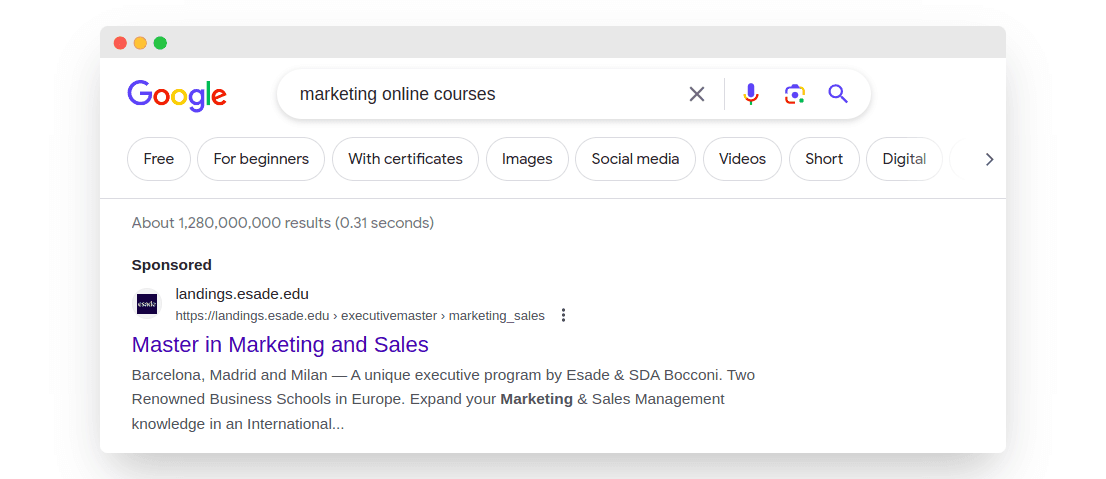
Since search ads don’t involve visual creatives, there are two main components of a successful ad: creating a brief, catchy text and matching the keyword’s search intent to the content of your page. The second part is more complicated.
You first have to choose the right keywords for your ad campaigns. Typically, you’ll have to choose a couple of keywords that fit the page that you’re trying to promote. You also have to run the ad in the exact match mode for longer keywords targeting specific courses. Otherwise, Google might take your ad for a keyword like “sewing online course” and show ads for keywords like “sewing accessories” and “online course.”
Then, you have to match the keyword with the right page on your site. This is especially important if you’re pointing all paid traffic to your home page. A specialized tool like Competitive Research by SE Ranking can help you pair the keywords with the right pages on your site or suggest creating new ones.
Examples of successful online Ad campaigns
The best way to understand how to build an effective advertising campaign is by studying examples. Unfortunately, unlike display advertising or TV commercials, finding records of effective search and display ads is more difficult.
However, there are several online course companies that have created campaigns prominent enough to become a source for a case study. We’ll look at different examples and analyze what aspects can be used in your company.
Udemy
Even though Udemy stock is going down slightly, the company has exceeded expectations, with 16% YoY growth last year. It owes this partly to its simple yet effective ad campaigns. What it does is it dominates search.
For most keywords focused on online courses of different types, you’re likely to find Udemy in the ads that you see on the top of the search results page.

While we can’t have access to Udemy’s Google Adwords data, by the sheer amount of ads being served, we can assume the campaign they run is pretty significant in scope. It’s also likely to be configured for increasing brand awareness instead of just driving conversions.
By targeting a large number of keywords related to different courses, Udemy can show up on thousands of searches, familiarizing users with the brand. It can also tailor the message in the ad to a specific demographic.
In some cases, Udemy also targets informational keywords. The ads for these types of keywords typically lead to a short article that informs the reader about the topic they were searching for and redirects their attention to a course with a CTA.
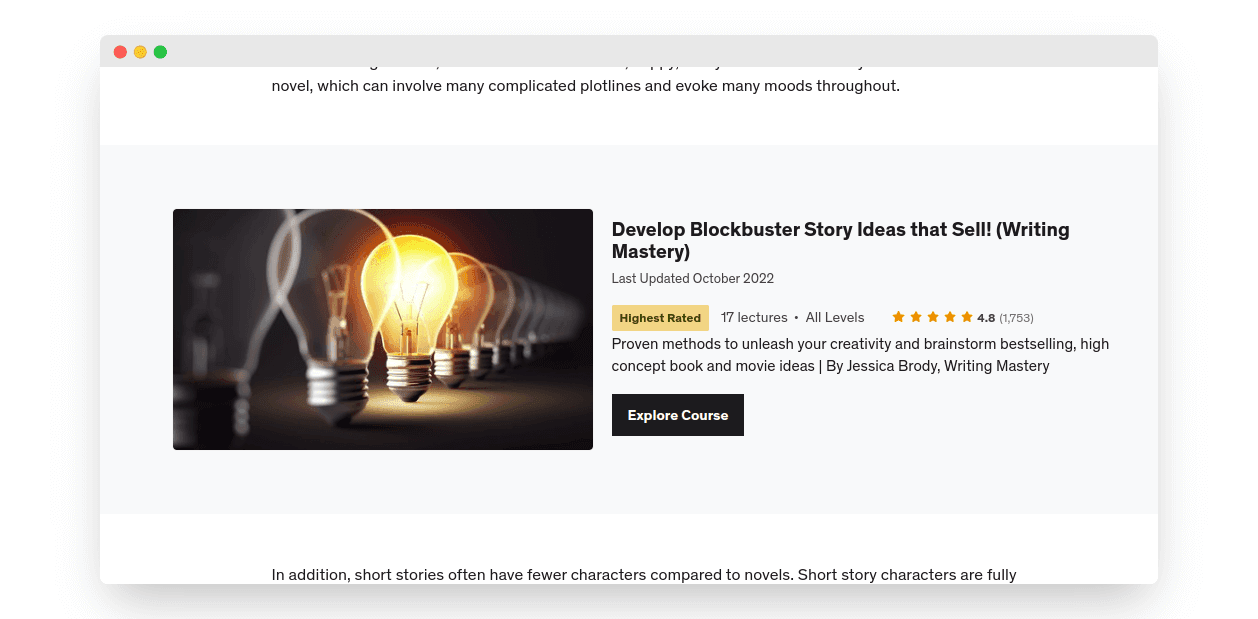
Borrowing this technique will help you avoid having a high bounce rate by serving a landing page that doesn’t fit the search intent and converting some of the traffic at the same time.
Also, most Udemy search ads mention ChatGPT as one of the key aspects of the course. This way, the company makes itself related to the latest trend.
MasterClass
Another online course company you probably know is MasterClass. The thing that makes it stand out is that the courses on the platform are led by famous people like Gordon Ramsey or Chris Hadfield. While not all online course companies can afford the fees it takes to work with world-class celebrities, you can still learn from this company’s ad campaign.
Its main approach is to use targeted video ads. Most of these video ads run pretty similarly — the expert who runs the course introduces themselves and shares what the course is going to be about. MasterClass also does a remarketing campaign to re-engage people who have already seen their ads that present a variety of other courses.
What you can take from here is that authority sells, perhaps even more than factual information about your courses. If you have a course author who can boast good experience on the topic, consider making it the main point of your advertising.
Another thing to consider is the power of video ads with a narrative structure. MasterClass doesn’t try to sell the course by listing the number of hours it has or the value you can get out of it. Instead, they focus on creating an almost magical picture of the new, unexplored world you’re about to enter with this new course.
If your digital products are favored by people trying to learn new fun things, not professionals upgrading their knowledge for purely materialistic reasons, this could be a good angle for advertising.
Coursera
Unlike MasterClass, Coursera is more tailored towards learners who are interested in improving their professional lives with online courses and is even issuing certificates. Their advertising messaging reflects this, as most of their ads focus on promoting the value of the course to the career or sharing uplifting messages like this one.
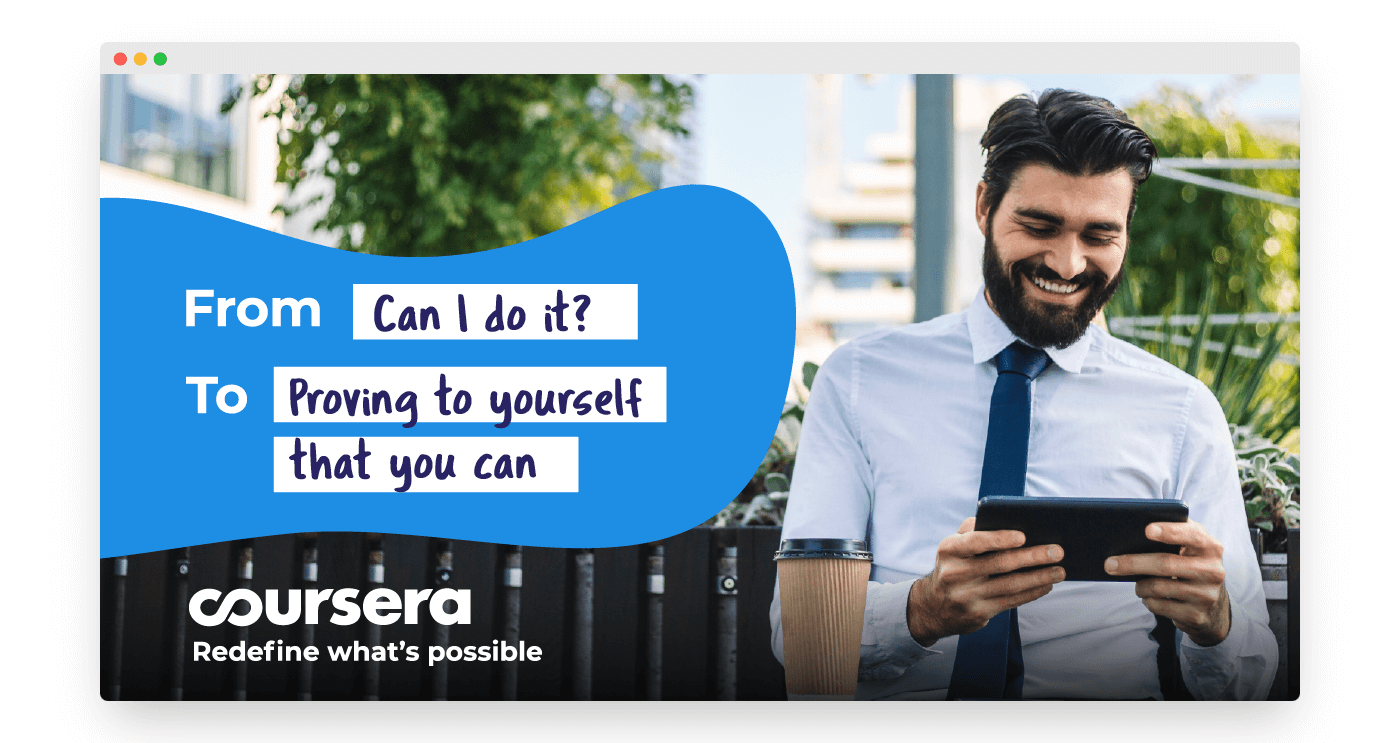
As many people who take a beginner or intermediate course in a new career field are job switchers, Coursera doesn’t just promote on LinkedIn but also on other social media platforms like Facebook. The messaging revolves around building a job-ready skillset and preparing for a new career.
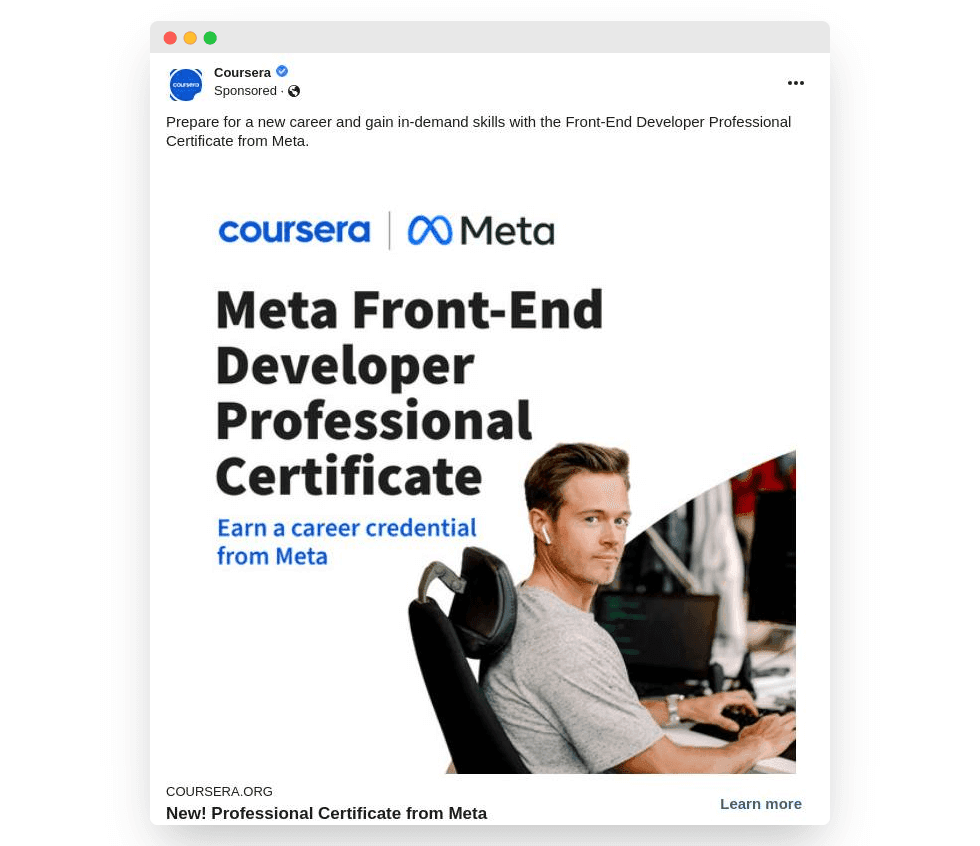
If your company offers courses to job seekers, you could borrow the angle of the messages in the ad campaigns. Another good idea that you can borrow from them is sharing success stories of clients, preferably with cases of getting a new job thanks to the course.
Codecademy
Codecademy, as the name suggests, is a company that markets online coding courses. One of its successful ad campaigns took a different approach. Instead of presenting the benefits you can gain from enrolling, it went for attention-grabbing imagery.

The whole campaign that contains several images like this paints a picture of an unsure future full of unknown challenges that only coding can tackle. Essentially, it creates a call to arms, saying the world needs you. It also features images that are sure to grab attention and provide a bit of humor.
What you can add to your online course ad campaign strategies is using the appeal to a higher calling for your courses. For instance, if you offer a math course, you could make a bold claim that your nation needs bridges and knowledge of mathematics can help. That might be too unrealistic of a goal, but practical results of knowledge might be good motivation for some of your clients.
Thinkific
Thinkific offers a range of courses for younger learners aimed at helping with school and extracurricular activities. That’s why some of their campaigns are tied to specific times of the year, specifically, late summer or early autumn when most kids go to school. Seasonality of ads like this back-to-school campaign is one thing you can learn from them.
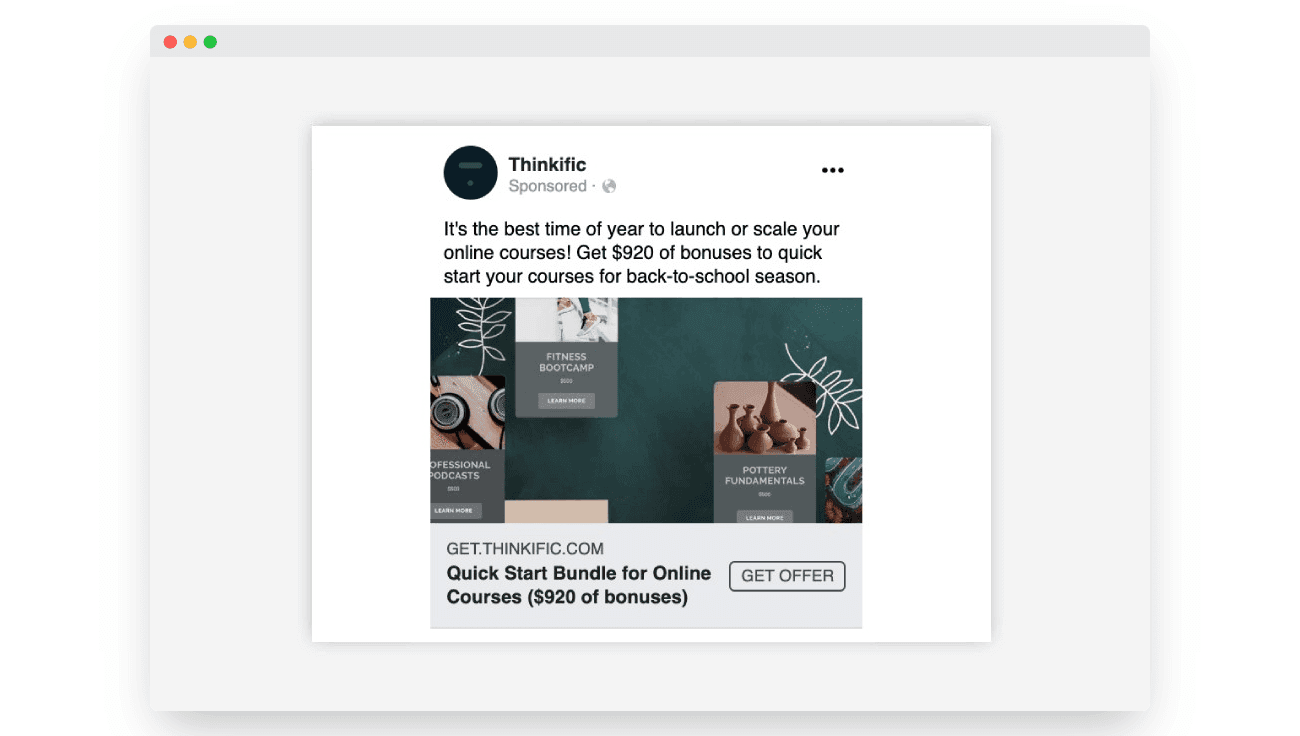
Another one is matching the ad to the landing page right. In advertising, the ad itself only draws the attention of the user. It’s the landing page that influences the final decision to make a purchase.
Thinkific does everything by the book on the landing page tied to this ad — a quick way to covert at the very top of the page, creates a fear of missing out, and highlights the savings a client would get by grabbing the deal.
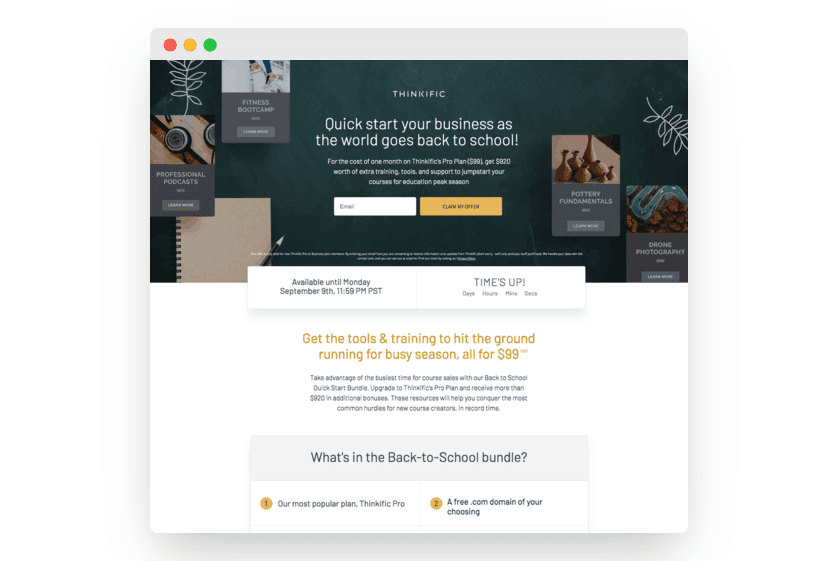
Conclusion
Promoting online courses with ad campaigns is a marketing technique that every business should get into. The most important thing for success is to come to the table with an understanding of your customers and how your product can best serve them.
Take inspiration from the examples of the best online course marketing campaigns, get creative with the messaging, and analyze the results to optimize the campaign.

Sergey Butko
Tech entrepreneur. Forbes 30 Under 30 Europe. At Certifier, Sergey’s work focused on revolutionizing the way credentials, certificates, and badges are issued and managed through cutting-edge APIs and software infrastructure.
Sergey Butko
Tech entrepreneur. Forbes 30 Under 30 Europe. At Certifier, Sergey’s work focused on revolutionizing the way credentials, certificates, and badges are issued and managed through cutting-edge APIs and software infrastructure.
Share this article